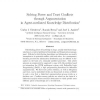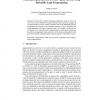IBERAMIA
2010
Springer
13 years 7 months ago
2010
Springer
In a recent paper [2] the authors have formalized a recursive semantics for warranted conclusions in a general defeasible argumentation framework based on a propositional logic. Th...
KES
2006
Springer
13 years 9 months ago
2006
Springer
Distributing pieces of knowledge in large, usually distributed organizations is a central problem in Knowledge and Organization management. Policies for distributing knowledge and...
FOIKS
2008
Springer
13 years 11 months ago
2008
Springer
Abstract. In this paper we recast the formalism of argumentation formalism known as DeLP (Defeasible Logic Programming) in game-theoretic terms. By considering a game between a Pro...
NMR
2004
Springer
14 years 2 months ago
2004
Springer
The development of Logic Programming and Defeasible Argumentation lead to Defeasible Logic Programming. Its core resides in the characterization of the warrant procedure. Defeasib...
ARGMAS
2004
Springer
14 years 2 months ago
2004
Springer
Negotiation can be conceived as the exchange of messages among self-interested agents in order to settle on an agreement over a given issue. They decide which messages to send acco...
ARGMAS
2009
Springer
14 years 4 months ago
2009
Springer
We describe a working multi-agent architecture based on Defeasible Logic Programming (DeLP) by Garc´ıa and Simari where agents are engaged in an argumentation to reach a common c...


